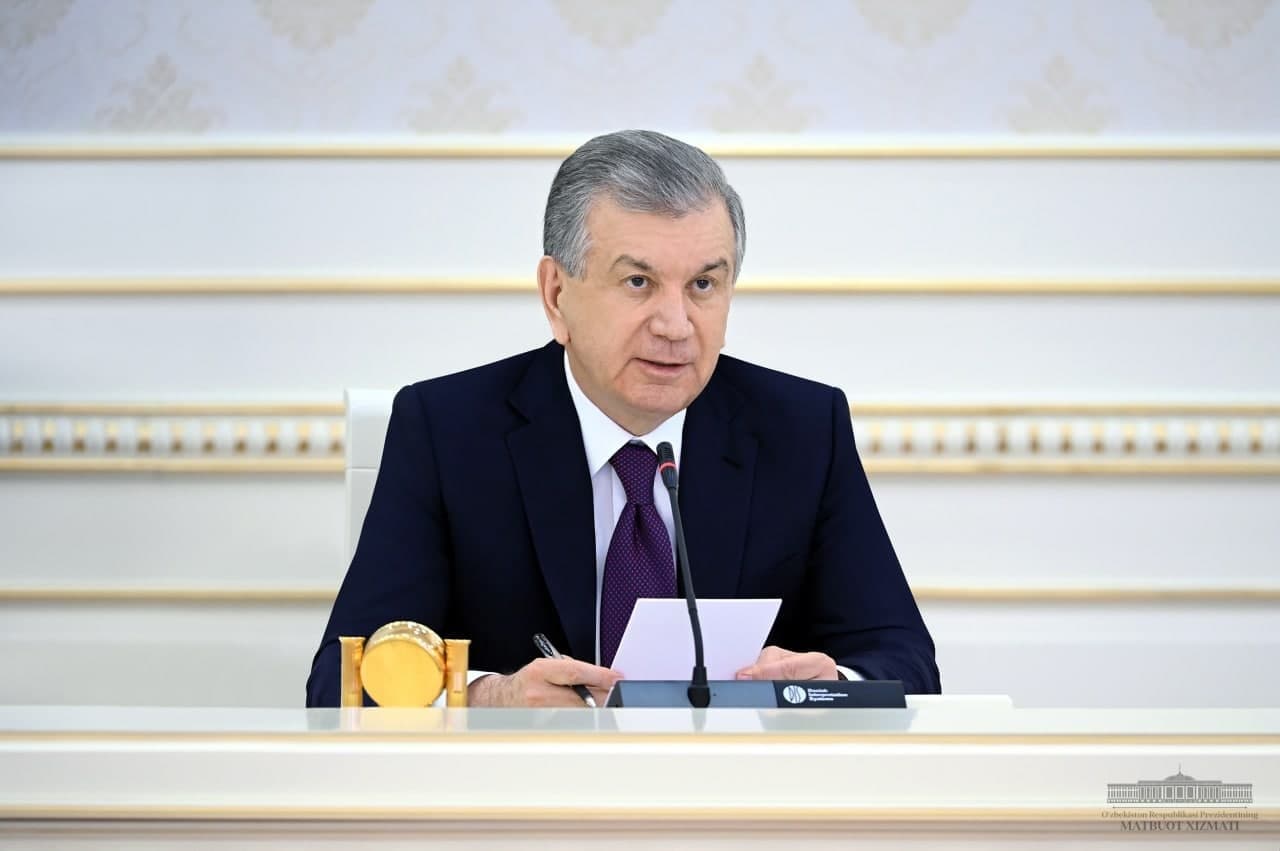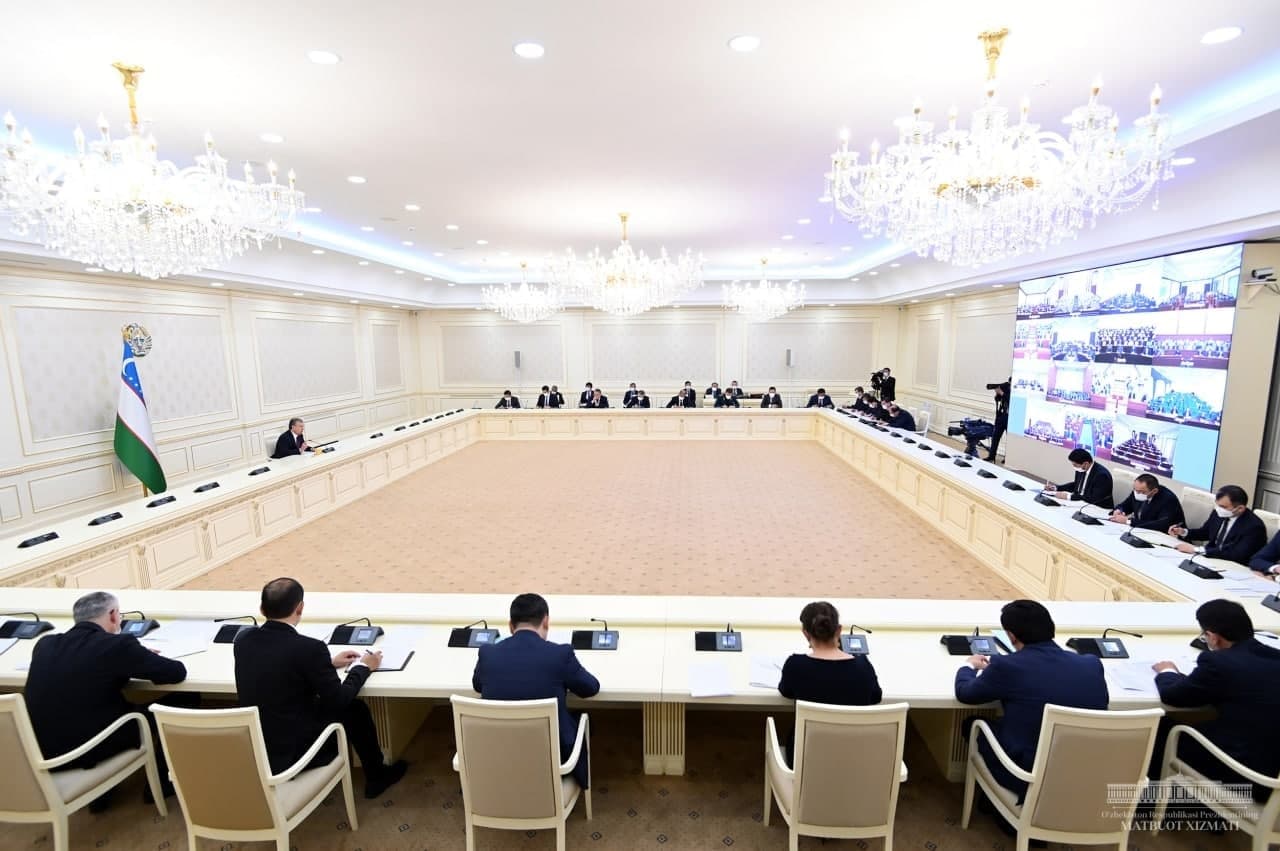
The Government portal of the
Republic of Uzbekistan
President Shavkat Mirziyoyev chairs a meeting for the development of local industry
2021-05-01 | Politics
On April 30, President of the Republic of Uzbekistan Shavkat Mirziyoyev chaired a meeting on measures for the development of local industry in the regions.

Building materials, furniture, household goods, clothing and foodstuffs are the most popular types of products among the population. It is easy and inexpensive to master their release. Such production stimulates the development of industry in rural areas and, therefore, the provision of employment for the population.
For example, over the past three years, the volume of production of building materials in the country has increased by 1.5 times. However, the current volume and range of products still do not meet the domestic demand. In 2020, nearly $1 billion worth of building materials were imported.
Many houses, factories and enterprises, social facilities are being built in Uzbekistan. This increases the demand for both building materials and products from related industries.
In this regard, the development of local industry and production growth were discussed at the meeting.
“As you can see, a difficult situation is reigning in the global economy. It is difficult for everyone. Therefore, we must use the available opportunities, achieve results, fairly conveying to the people everything that we get by honest labor. The development of the local industry is also the competence of hokims. If you work wisely, thoughtfully, you can realize the potential inherent here. These are employment, the benefit of entrepreneurs, and the well-being of the population”, Shavkat Mirziyoyev said.
The need for organizing work in this direction along the chain “study of domestic demand – analysis of imports – determination of the resource base – development of new projects” was noted.
The Ministry of Investments and Foreign Trade was instructed to develop, in the context of regions, special programs for the development of local industry, including the sectors of building materials, textiles, silkworm breeding, pharmaceuticals, electrical engineering, the production of leather and footwear, jewelry, porcelain products, furniture, as well as the food industry.
The Head of the state supported the proposal to specialize 24 districts of the Republic of Karakalpakstan and regions in the production of building materials. It was instructed to organize new enterprises in these districts, using the existing raw material base and infrastructure of large factories. It was decided to allocate an additional 400 billion UZS from the budget to improve infrastructure in these districts, and another 100 billion UZS will be allocated for geological surveys.
More than a thousand new projects worth $5 billion have been developed in the building materials industry. It is planned to employ more than 25 thousand people.
Sanoatqurilishbank (Uzbek Industrial and Construction bank) proposed to open a credit line for these projects for $300 million, to provide entrepreneurs with practical assistance through consulting centers in the branches of the bank. The President instructed to allocate an additional $200 million from the state budget through this bank.
It was noted that guarantees for up to 15 billion UZS will be issued for projects for the production of new types of construction and finishing products. Such manufacturers will be reimbursed for payments on loans in national currency in the part exceeding 10 percent of the Central Bank rate, as well as 50 percent of the rate on foreign loans.
Manufacturers operating in rural industrial zones, as well as developers of deposits and quarries, will be able to count on a reduction in the amount of the land tax by up to 10 times.
It was noted that these opportunities will serve to increase the production of building materials by 40 percent, expand the range of products and replace imports.
The most effective way is to analyze the structure of imports entering the district or city and produce these products in the region.
For example, over the past two years, about 6 thousand apartment buildings have been built, almost 30 percent of the materials used in their construction were imported from abroad. Electrical equipment, furniture, kitchen utensils and other household goods for at least 20-30 million UZS will be required for each of about 100 thousand apartments, which are planned to be built this year.
Therefore, the responsible persons were instructed to increase the number of projects for the localization of in-demand goods based on the analysis of market demand, to rationally place such goods in industrial zones in the regions.
The importance of identifying districts with in-depth development of the production of other types of industrial goods, the implementation of new projects in them was emphasized.
Industrial cooperation is also very important for the development of the local industry. In particular, about a thousand contracts worth 376 billion UZS were signed last week at an industrial fair in Navoi.
It was noted that such events should be held in the Republic of Karakalpakstan and each region.
The quality of products of the local industry must meet the market requirements. This ensures its competitiveness and stability of the enterprise.
In this regard, the Uzstandard Agency was tasked with organizing modern laboratories in 24 specialized districts and training manufacturers in international requirements and quality standards.
Starting July 1 this year, enterprises producing new types of building materials will be reimbursed 50 percent of the costs associated with the implementation of international standards. The list of construction products subject to mandatory certification will be reduced by 3 times.
The issue of providing local industry with qualified personnel was also discussed at the meeting since the lack of modern engineers and technologists at the local level impedes the development of the industry.
The Ministry of Higher and Secondary Special Education was instructed to develop, together with foreign higher education institutions, the joint programs for training engineers and technologists, taking into account the needs of the regions.
Deputy Prime Ministers, heads of industries and regions presented information on the issues discussed at the meeting.

Source: UzA









